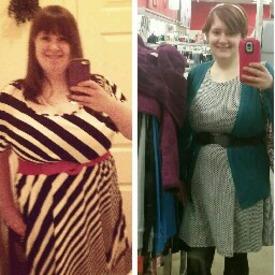Recipe Servings

ftsolk
Posts: 202 Member
Normally, if I'm at home and I cook a recipe (like a crock-pot soup), I'll immediately divide it up into containers using my measuring spoons (I have spoons that hold 1/2 and 1 cup portions) and I'll use that to determine how large a serving is.
But how do I figure out how large a serving is if I am, say, cooking dinner at a friend's house when I can't immediately portion the whole pot into separate containers?
But how do I figure out how large a serving is if I am, say, cooking dinner at a friend's house when I can't immediately portion the whole pot into separate containers?
0
Replies
-
Good guessing. The longer you count calories and create meals the better you get at estimating.0
-
Weigh the empty pot in grams and note this. Weigh the full pot, subtract the empty pot weight, and make this your total servings in the recipe builder. Weigh a bowlful and log that weight as number of servings.
For example, a pot of soup minus pot weight may weigh 3,000 grams, which would be your number of servings in the recipe builder, and one bowlful weigh 300 grams.0 -
Ok, but what if I'm making this at my friend's house and only have my mini scale? That wouldn't work.0
-
Does it have ingredients similar to your foods that you cook at home? Do your best guess.
If you expect to cook at your friends' house again, buy a scale to keep over there or bring yours with you.0 -
I have a little pocket scale, but it's not large or strong enough to fit a large crock-pot. I don't like lugging my home scale back and forth, so I bought a smaller scale for travel purposes. I cook at my friend's house quite a bit, but I usually stick with things like marinated chicken drumsticks. I'll take the weight of the package of chicken, and divide the servings up by the number of drumsticks in the package (1 drumstick=1 serving).
But it doesn't help with things like soup. Even in the case of making a pasta dish, I figured I'd mix it with cheese and do some kind of baked-ziti type thing so I can cut it up into individual portions.
But when I cook there, I often like trying new recipes, so I don't have a reference point to use. I can measure out a cup of soup, but that's useless if I don't know how many cups of soup a recipe makes.0 -
You just said you cook at your friends house quite a bit . so bring your scale , weigh the ingredients and log it. Easy peasy. You seem to over complicate things. Take a step back and think about this- you said you cook there quite a bit. So how hard would it be to bring your scale along or buy a 10$ one from Walmart and leave it over there. There's no reason to keep over thinking these types of things. Your making this harder then it has to be.0
-
Because I don't really have the right to leave all of my stuff over there. I bought a POCKET scale for purposes of travel, but not for weighing large hot pots of soup. What if, in my rush to grab everything, I forget to pack my larger scale?0
-
You could always resort to estimating using geometry. Most cooking pots are cylinders.
I've found that you can use fluid ounces for soups and stews to estimate weight ounces; it is not going to be too far off actual weight ounces.
Step 1: Determine volume of food in cubic inches.
volume of cylinder = Pi x radius squared x height
= 3.14159 x radius x radius x height
radius = 1/2 of diameter of pot
height = height of food in pot
measure diameter of pot, lets say 8 inches
... so radius = 1/2 of diameter = 4 inches
measure height of food in pot, lets say 3.5 inches from bottom of pot to top of food
... so height = 3.5 inches
volume of food in pot = 3.14159 x 4 inches x 4 inches x 3.5 inches
= 175.93 cubic inches
Step 2: Convert cubic inches to cups or fluid ounces.
Since 1 cup = 8 fluid ounces = 14.4375 cubic inches
175.93 cubic inches x ( 1 cup / 14.4375 cubic inches) = 12.19 cups
.... or .....
12.19 cups x (8 fl oz / cup) = 97.52 fl oz.
All you need to do is measure the radius of your pot and the height of the food in the pot and then plug those two values in the above equations.
I hope this helped and wasn't too confusing.0 -
I tried weighing my crockpot with water in it, and it was too heavy for my kitchen scale.0
-
I'm not sure I'm understanding why this is so complicated. Are you following a recipe for the soup? How many servings does the recipe say it makes? 4? 6? 8? When you serve it up, is it just you and your friend eating it? That's two servings. When you are finished eating, what happens to the leftovers? Pack them up and save them? How many more did you end up with? About what the recipe said? More? Less?
I know it's not as exact as weighing it but this is exactly how I managed my weight loss and maintenance and it has not hindered my results.
You've been doing this long enough OP that you should be able to use some reasonable estimates for these kind of situations rather than overly complicating the situation and stressing out about it.0 -
I'm not really following a recipe. I'm just throwing whatever veggies I can find and some chicken into a crock pot.
And it's my friend, her husband, and three kids eating it, so it's not like I can dish out two equal servings and then guestimate how many servings I have left. Which is why I figure it's easier to figure out the nutritional information per cup.0 -
Besides, recipes never yield the amount they're supposed to.0
-
Besides, recipes never yield the amount they're supposed to.
But they are reasonably accurate. If the recipe says it makes 8 servings and you get 4 out of it, then you've eating 2x the serving since. If you get about 6, them you've eating 1.5 servings. If you are feeding 5 people it's likely that you aren't going to have more than 1 serving leftover unless you are really making an industrial size pot of soup.
Build the recipe the way you would at home. Dish the meal up. Do some basic division. Or just log one of the meals you've made at home before. It will be within an acceptable margin of error. Add 20% if you're concerned.
0 -
Does your friend has a fluid ounce/metric measuring cup? Use that to measure out your own serving , then approximate components at home.
I know how much my usual coffee mugs hold and use them as rough measures to estimate serving sizes when I am out.
For example, 1 cup chicken broth Rachel Ray, 2 oz boiled chicken, 2 oz Bolthouse baby carrots, 1 10"stalk celery,etc. You should be able to eyeball what 2 oz of boiled or roasted chicken looks like at this point. That will get you close on calories, although things like sodium or fat may be off0 -
I don't know how this quote things works (at least not consistently) so I have to agree with WinoGelato. It seems like you're over complicating this. Why not cook it at home (or fill the crockpot at home), and bring it to your friends? 3 adult servings, 2 children. I would count that as 4 servings.
You sound as OCD about measuring as I do. Relax.0 -
There is also the volume scaling. 2 quart sized crockpot? Filled will make 8 cups. Could also eyeball the level the food sits at and then when empty add that amount of water 1cup at a time to figure how many cups total. It may not be the greatest but if you insist on guesstimating this is better than nothing.0
-
You could always resort to estimating using geometry. Most cooking pots are cylinders.
I've found that you can use fluid ounces for soups and stews to estimate weight ounces; it is not going to be too far off actual weight ounces.
Step 1: Determine volume of food in cubic inches.
volume of cylinder = Pi x radius squared x height
= 3.14159 x radius x radius x height
radius = 1/2 of diameter of pot
height = height of food in pot
measure diameter of pot, lets say 8 inches
... so radius = 1/2 of diameter = 4 inches
measure height of food in pot, lets say 3.5 inches from bottom of pot to top of food
... so height = 3.5 inches
volume of food in pot = 3.14159 x 4 inches x 4 inches x 3.5 inches
= 175.93 cubic inches
Step 2: Convert cubic inches to cups or fluid ounces.
Since 1 cup = 8 fluid ounces = 14.4375 cubic inches
175.93 cubic inches x ( 1 cup / 14.4375 cubic inches) = 12.19 cups
.... or .....
12.19 cups x (8 fl oz / cup) = 97.52 fl oz.
All you need to do is measure the radius of your pot and the height of the food in the pot and then plug those two values in the above equations.
I hope this helped and wasn't too confusing.
Epic answer. I'd like to stickie this.
OP, give up weighing at your friends place. Guess.
0 -
judyvalentine512 wrote: »I don't know how this quote things works (at least not consistently) so I have to agree with WinoGelato. It seems like you're over complicating this. Why not cook it at home (or fill the crockpot at home), and bring it to your friends? 3 adult servings, 2 children. I would count that as 4 servings.
You sound as OCD about measuring as I do. Relax.WinoGelato wrote: »Besides, recipes never yield the amount they're supposed to.
But they are reasonably accurate. If the recipe says it makes 8 servings and you get 4 out of it, then you've eating 2x the serving since. If you get about 6, them you've eating 1.5 servings. If you are feeding 5 people it's likely that you aren't going to have more than 1 serving leftover unless you are really making an industrial size pot of soup.
Build the recipe the way you would at home. Dish the meal up. Do some basic division. Or just log one of the meals you've made at home before. It will be within an acceptable margin of error. Add 20% if you're concerned.
I might have more than 1 serving left out of a recipe that feeds six if three of the people eating it are kids under the age of 8.
Making it at home and bringing it there isn't an option. I have to go straight there after work (when I cook there, I drop things off before work) because I often am needed to babysit for an hour or so. I don't have time to go home and pick up anything. Getting there on time after work is hard enough at times with traffic and such.0 -
It's just not that complicated. Kids don't eat as much as grownups? Fine. Do they eat about half as much? Factor that in. Your babysitting and commute and eating dinner at a friends house just should not be this big of a complicating factor. Just figure it out. Log whatever it is that you logged the last time you made this soup at home. Add 10% for different size serving. It is chicken soup right? Veggies and broth? Any cream? Any cheese? Log 350 cals and be done with it. If your logging was as accurate as you are trying to make this dilemma out to be you would never eat out or eat at a friends house and you wouldn't accept the WW free fruits and veggies like you mentioned in your other thread.
For years you've been starting these threads and you throw in all these excessively detailed reasons why you can't be successful or why the suggestions people make won't work for you. Do you think everyone walks around with a food scale in their purse, or never shares meals with friends? You can do this. Life is not always accurate nor precise. Most of the time "directionally correct" is just fine.0
This discussion has been closed.
Categories
- All Categories
- 1.4M Health, Wellness and Goals
- 395.6K Introduce Yourself
- 44.1K Getting Started
- 260.7K Health and Weight Loss
- 176.2K Food and Nutrition
- 47.5K Recipes
- 232.7K Fitness and Exercise
- 446 Sleep, Mindfulness and Overall Wellness
- 6.5K Goal: Maintaining Weight
- 8.6K Goal: Gaining Weight and Body Building
- 153.2K Motivation and Support
- 8.2K Challenges
- 1.3K Debate Club
- 96.4K Chit-Chat
- 2.5K Fun and Games
- 4.3K MyFitnessPal Information
- 16 News and Announcements
- 1.3K Feature Suggestions and Ideas
- 2.9K MyFitnessPal Tech Support Questions









